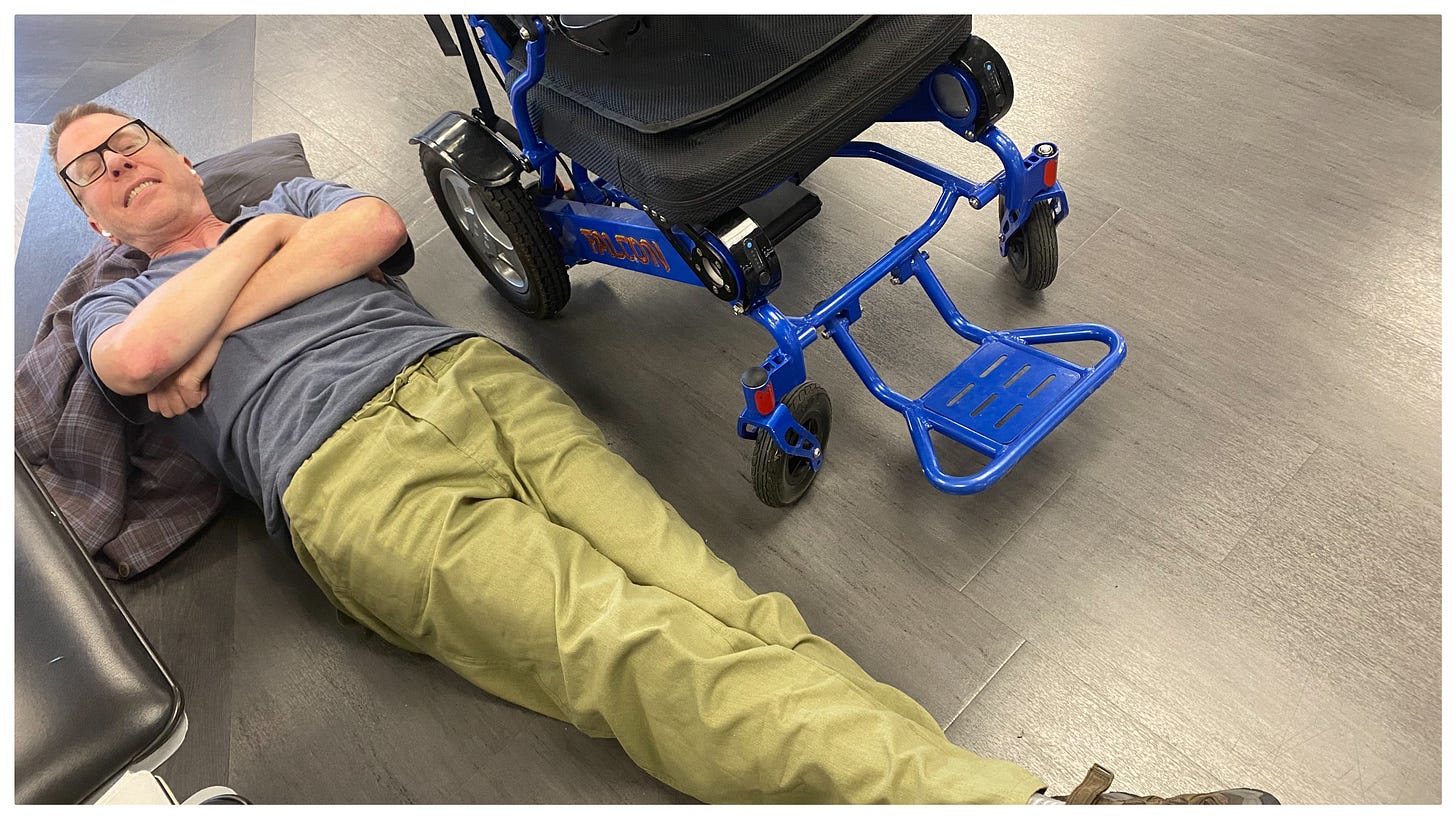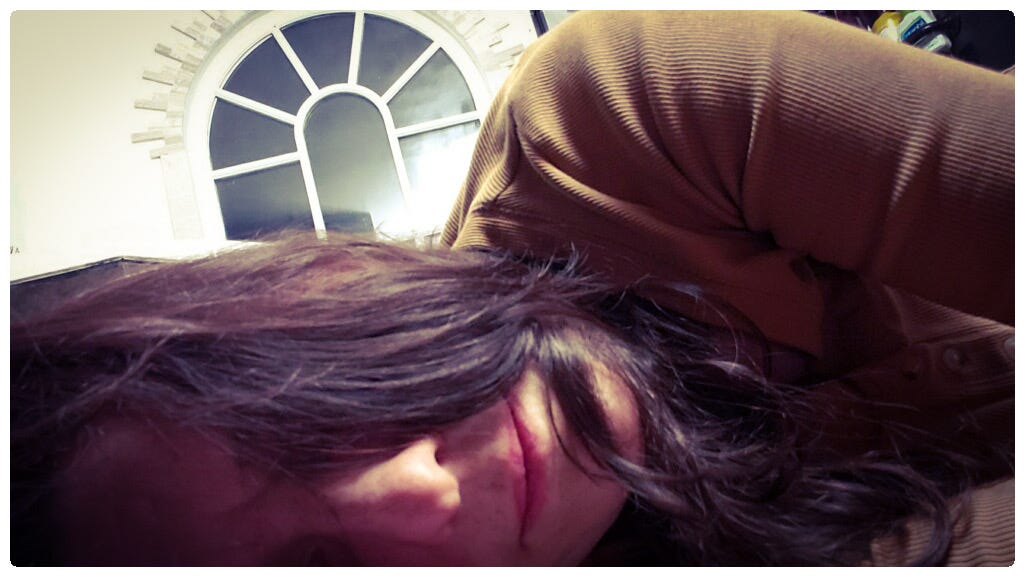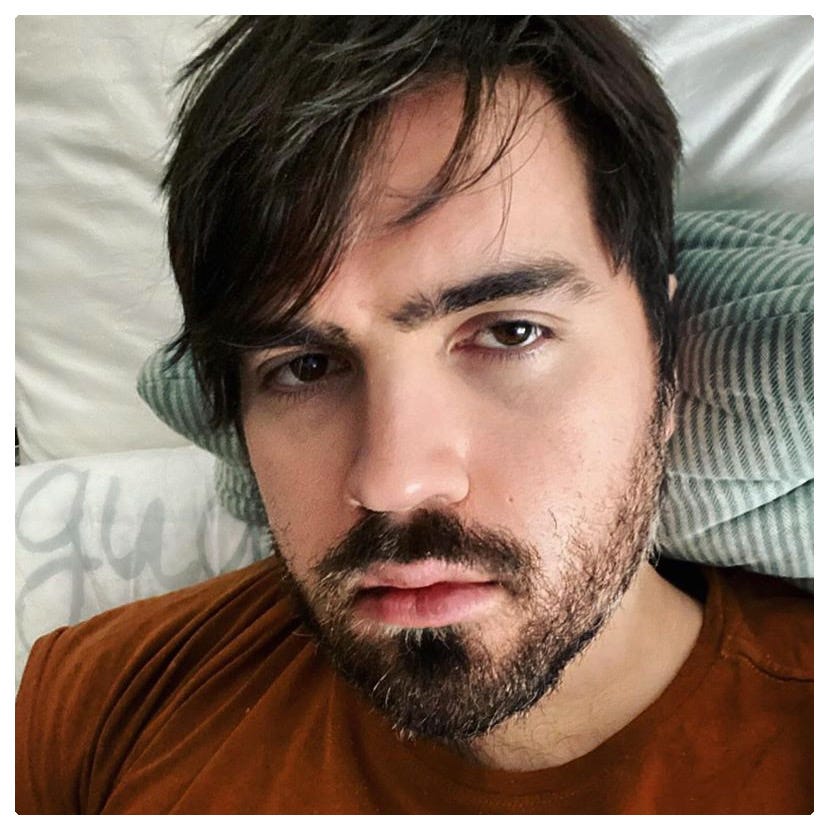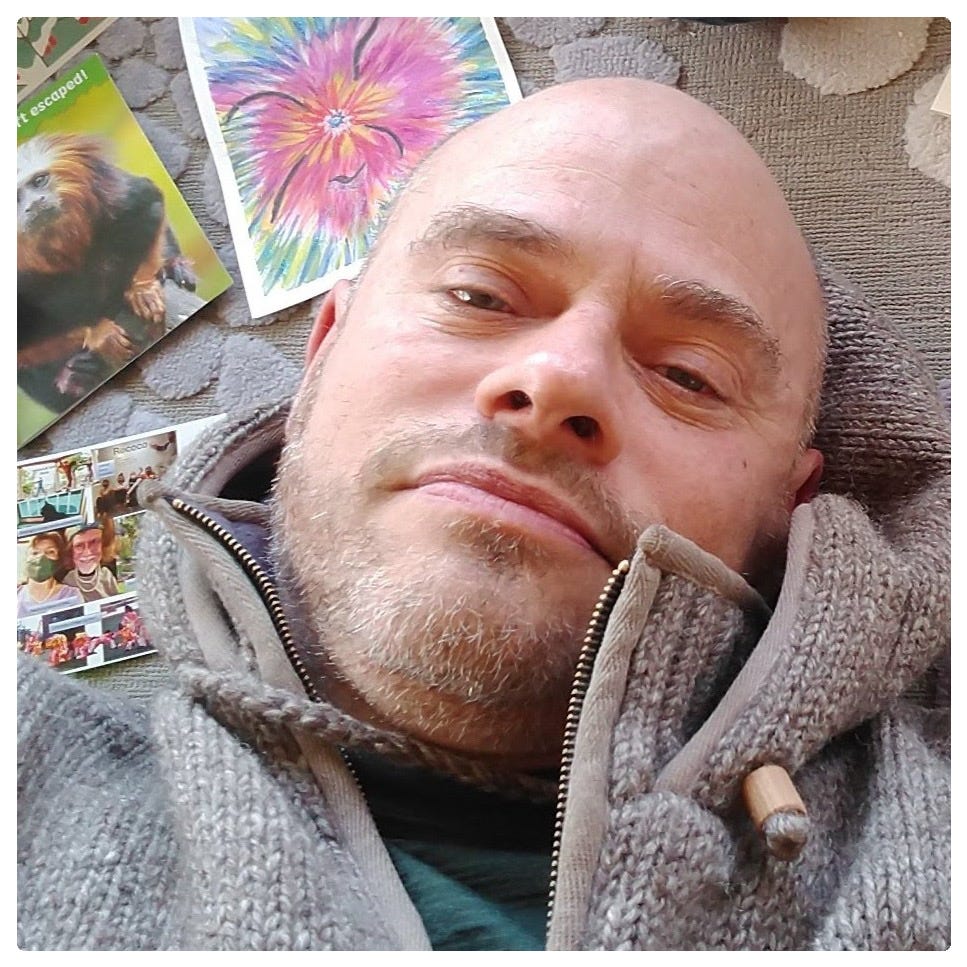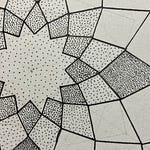Join Hal in supporting the work of OMF
Hi. I just donated $55 to support the work of Open Medicine Foundation. I hope you’ll join me is supporting this good cause. (Link Below)
On September 10, OMF’s Founder & CEO Linda Tannenbaum is tying up her laces for the 2023 Surfers Point Marathon to raise awareness & fund collaborative research for ME/CFS, Long COVID, & related diseases.
Double Your Impact - Linda & her husband are matching all donations up to $10,000! That means every dollar you give is doubled in its power to change lives.
Severe
It's hard to imagine that my current condition might not be considered "severe." It sure feels severe to me -- the incessant ringing in my ears, the cold, damp feeling all over my body, the dense fatigue in my brain, the constant battle with my breathing, the aching weakness in my legs, the burning dryness of my eyes and the not-so-subtle turning in my stomach. It's a difficult and intense experience living in my body these days and I get little relief. When I'm up and about, I have an almost perpetual longing to get back into bed. At times, the illness consumes me... and I'm not even severe. Maybe the label doesn't matter so much, but out of respect for the ME/CFS patients that have it so much worse than I do, I'm willing to call my state of illness "moderately severe."
Here’s the level of my wellness. I'm able to hop up easily from the bed to use the bathroom. I'm able to prepare my own meals. I can ride my scooter into town for groceries. I'm able to sit on my front porch and play the handpan for a little while. I can sit up at my laptop and write for forty-five minutes straight. On Sunday, I went to church. And last week, with the help of a wheelchair and my nonagenarian mother, I travelled to Miami, Florida to see my daughter in a play. Hallie gave a stunning performance in a cutting edge production of The Little Mermaid and I got to be there for opening night. The trip was definitely a stretch and it may have been foolish, but I'll do anything to be in the same room with Hallie Walker.
I feel sick most of the time and I spend much of the day in bed, but I know how much worse it could be. Like a hidden monster, "severe" is always looming around the corner. I've heard the stories, I've read the posts and I have friends in the severe community. I've experienced first hand the unforgiving nature of ME/CFS. But I'm not severe. I don't need a caregiver, I can drive short distances and today, I've got a good appetite for breakfast, lunch and dinner.
My friend James, who’s completely bedridden, mentioned that everyone with this illness thinks they're "severe." With symptoms more intense than they've ever experienced before, most people can't imagine what it would be like if it got worse. Then it gets worse and they realize the blessing of what they had before. I'm sorry to report that my level of severity has recently worsened. I'm sicker than I was six weeks ago. This decline has significantly impacted the quality of my life. Everything is more difficult. Writing this episode is more difficult. Recording it is more difficult. And just facing a day is more difficult than it was six weeks ago.
The summer cold that I caught on July 12th made a profound change in the baseline of my symptoms. There's no way to know if it's a permanent shift, but it sure feels that way. A couple years ago, my friend Peggy introduced me to the term "perma-crash" and it's been haunting me ever since. This feels like a perma-crash. It's like my body has locked into a new normal and it can't find its way back out. That's the crazy ruthlessness of Myalgic Encephalomyelitis. Everything can change overnight just because you went out into public one day and accidentally caught a little cold. I'm living now with the regrets of having not been more cautious, but I was just trying to live a life. Without my permission and against all my plans, reality points to the fact that this cold has moved me one step closer to "severe." But I'm not severe. I'm "moderately severe." Knowing what I know about severe, I'm truly grateful for the function and the wellness that I have today.
Aug 8 was Severe ME/CFS Awareness Day. Begun by an organization called the 25% M.E Group, the day calls attention to an illness that is mostly hidden in the darkened rooms of the "millions missing." All around the globe, people are fighting for their lives and too often, they’re losing the battle. The organization writes:
Severe ME Understanding & Remembrance Day is a day to honour the strength of spirit of all those who have endured and continue to endure decades of suffering and profound physical dysfunction and yet receive little, or no recognition or help, but rather continue to experience gross misrepresentation and misinterpretation of their illness and profound disability.
To honor this day, I’ve asked a handful of friends to share their experience of being "severe." A couple of them were not well enough to contribute. So today, I share the brief reflections of three people that are living with severe ME/CFS.
Peggy Munson is a friend of mine who lives on couple beautifully gardened acres in Western Massachusetts. I enjoyed a face to face visit with her last March. She’s been living with a severe version of this illness since 1992.
What severe means to me. Well the math never works out. I can save my energy for weeks and weeks and weeks and I never have enough to do anything really fun. I have not been able to get home to Illinois, where I grew up for 25 years now almost. I can almost never be around people. The social isolation is just brutal for me because I crash so badly from human contact which has to be the worst. I'm so jealous of people who have even a little bit more health than I do and yet I feel alot of sorrow for those who have it even worse. Disconnect from everything that I thought my life would be.. my aspirations, my dreams, my hopes.. it's just gone.
Martin Hippe lives in Germany. I met him on Instagram. (@paused_me) He’s been living with this illness since 2013. Using the energy that he has to raise awareness of the illness, Martin is an outspoken voice for the ME/CFS community.
Being very severe with ME/CFS means loss of self efficacy. The disease is degrading. It imprisons. It tortures. For me, it led to artificial feeding. There was a tube in my bed for 2 1/2 years. It led through the abdominal wall into the stomach. Without the tube, I would be dead today. I would have wished it at that time. Being severe means consciously witnessing how the body is tied to the bed. It is sad. Friends leave. Everyday is cruel and painful. It is torture. When it gets you, you are neither alive nor dead. You have very severe ME/CFS.
Before the sudden onset of the illness on October 26, 2018, Martin Keogh toured the world teaching and performing dance. He recently published his sixth book. It’s a book of poems called “Naked Realities.” You will find him on facebook as “the Missing Neighbor.”
I am one of the millions missing and I go by the name "The Missing Neighbor" and here we are marking those of us who are severe with ME/CFS. For myself, I'm bed bound about 22 hours a day. This is what it's like. Overdoing becomes the death of me. So I do everything in my power to keep from crashing with all its symptoms to not terrify myself and my family. I vigilantly practice pacing, do less than I'm able and live by the motto, "Bed is Beautiful."
Thank you so much to both the Martins and to Peggy for sharing your voices. From my bed to yours, somehow we’ve got to stick together through all this. I feel like you’re my siblings on this journey. Thank you everyone for taking the time to read this post. I never imagined myself being in the position of having to write so personally about such a difficult topic. Your attention means a lot to me.
As always, have a great week. And don’t forget. Enjoy living in that body of yours. What a blessing is this life — with all its joys and all its challenges. I’m reminded that in any moment, I can choose joy, so that’s what I’m gonna do right now. Ah… joy. All the best to you. Sending love. Hal
More about Severe
From the Website https://25megroup.org/me/
ME is a WHO classified neurological disease with multi-system dysfunction.
It is a physical disease that, in its more severe forms, is severely to profoundly disabling.
The most severely affected have multiple serious symptoms, often not investigated or under-investigated, that incapacitate people to such a degree that 25% of them are effectively house bound or bed bound, may use wheelchairs part or full- time and are barely able to move.
There is no cure. There is no consistent or universal treatment. The pain of Severe/Very Severe ME is so extreme that drugs do not touch it and many are forced to take extremely strong drugs to gain minimal reductions in pain levels. Others have no pain relief at all due to acute drug sensitivity.
Quality of life tests indicate that severe ME sufferers feel every day significantly the same as an AIDS patient feels two months before death. 98% of people with severe ME do not get better. Peterson describes ME as “one of the most disabling diseases that I care for, far exceeding HIV disease except for the terminal stages”.
25% of sufferers with severe ME describe themselves as bedridden, and 57% have been either housebound or bedridden for more than six years, illustrating “in numbers rather than words that morbidity in ME can be substantial, despite the opinion of many healthcare professionals to the contrary.”
Researchers have demonstrated numerous abnormalities of the immune, muscular, cardiovascular, and central nervous systems. The emerging picture is of a multi-system disease with a strong component of immune and neurological dysfunction. The World Health Organisation recognises ME as a neurological illness.
ME describes an illness characterised by a combination of muscle pain (myalgia), and neurological and cognitive symptoms such as memory loss and concentration difficulties (hence ‘encephalomyelitis’). As with any illness, the symptoms and disability which results will be experienced differently by each individual. Symptoms can vary in severity and commonly include chronic pain and lack of stamina/weakness of the muscles and limbs, acute hypersensitivity to stimuli such as light and noise, cognitive and memory problems, vocal/muscular limitations, multi-joint pain, and severe migraine type headaches.
Severe ME– “Will be able to carry out minimal daily tasks only, face washing, cleaning teeth, have severe cognitive difficulties and be wheelchair dependent for mobility. These people are often unable to leave the house except on rare occasions with severe prolonged after-effect from effort.”
Very Severe ME– “Will be unable to mobilise or carry out any daily tasks for themselves and are in bed for the majority of the time. These people are often unable to tolerate any noise and are generally extremely sensitive to light.”
This means their physical and mental limitations are very acute. Commonly the person will require to use a wheelchair to get around, help with transferring from seat to seat within and out with the home, and may have problems with sitting up, using their arms and hands for even simple tasks like doing up buttons on clothing, and have difficulties toileting and bathing themselves. Some very severely affected patients are unable to do any of these tasks because of very severe pain and muscle weakness (not due to misuse or under use) and even transient paralysis – normally down left side. This can leave the person unable even to swallow, or to turn themselves in bed.





